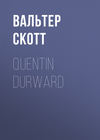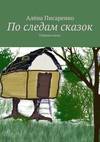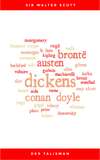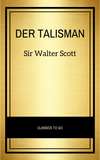Buch lesen: «Quentin Durward»
AUTHOR’S INTRODUCTION
The scene of this romance is laid in the fifteenth century, when the feudal system, which had been the sinews and nerves of national defence, and the spirit of chivalry, by which, as by a vivifying soul, that system was animated, began to be innovated upon and abandoned by those grosser characters who centred their sum of happiness in procuring the personal objects on which they had fixed their own exclusive attachment. The same egotism had indeed displayed itself even in more primitive ages; but it was now for the first time openly avowed as a professed principle of action. The spirit of chivalry had in it this point of excellence, that, however overstrained and fantastic many of its doctrines may appear to us, they were all founded on generosity and self denial, of which, if the earth were deprived, it would be difficult to conceive the existence of virtue among the human race.
Among those who were the first to ridicule and abandon the self denying principles in which the young knight was instructed and to which he was so carefully trained up, Louis XI of France was the chief. That sovereign was of a character so purely selfish – so guiltless of entertaining any purpose unconnected with his ambition, covetousness, and desire of selfish enjoyment – that he almost seems an incarnation of the devil himself, permitted to do his utmost to corrupt our ideas of honour in its very source. Nor is it to be forgotten that Louis possessed to a great extent that caustic wit which can turn into ridicule all that a man does for any other person’s advantage but his own, and was, therefore, peculiarly qualified to play the part of a cold hearted and sneering fiend.
The cruelties, the perjuries, the suspicions of this prince, were rendered more detestable, rather than amended, by the gross and debasing superstition which he constantly practised. The devotion to the heavenly saints, of which he made such a parade, was upon the miserable principle of some petty deputy in office, who endeavours to hide or atone for the malversations of which he is conscious by liberal gifts to those whose duty it is to observe his conduct, and endeavours to support a system of fraud by an attempt to corrupt the incorruptible. In no other light can we regard his creating the Virgin Mary a countess and colonel of his guards, or the cunning that admitted to one or two peculiar forms of oath the force of a binding obligation which he denied to all other, strictly preserving the secret, which mode of swearing he really accounted obligatory, as one of the most valuable of state mysteries.
To a total want of scruple, or, it would appear, of any sense whatever of moral obligation, Louis XI added great natural firmness and sagacity of character, with a system of policy so highly refined, considering the times he lived in, that he sometimes overreached himself by giving way to its dictates.
Probably there is no portrait so dark as to be without its softer shades. He understood the interests of France, and faithfully pursued them so long as he could identify them with his own. He carried the country safe through the dangerous crisis of the war termed “for the public good;” in thus disuniting and dispersing this grand and dangerous alliance of the great crown vassals of France against the Sovereign, a king of a less cautious and temporizing character, and of a more bold and less crafty disposition than Louis XI, would, in all probability, have failed. Louis had also some personal accomplishments not inconsistent with his public character. He was cheerful and witty in society; and none was better able to sustain and extol the superiority of the coarse and selfish reasons by which he endeavoured to supply those nobler motives for exertion which his predecessors had derived from the high spirit of chivalry.
In fact, that system was now becoming ancient, and had, even while in its perfection, something so overstrained and fantastic in its principles, as rendered it peculiarly the object of ridicule, whenever, like other old fashions, it began to fall out of repute; and the weapons of raillery could be employed against it, without exciting the disgust and horror with which they would have been rejected at an early period, as a species of blasphemy. The principles of chivalry were cast aside, and their aid supplied by baser stimulants. Instead of the high spirit which pressed every man forward in the defence of his country, Louis XI substituted the exertions of the ever ready mercenary soldier, and persuaded his subjects, among whom the mercantile class began to make a figure, that it was better to leave to mercenaries the risks and labours of war, and to supply the Crown with the means of paying them, than to peril themselves in defence of their own substance. The merchants were easily persuaded by this reasoning. The hour did not arrive in the days of Louis XI when the landed gentry and nobles could be in like manner excluded from the ranks of war; but the wily monarch commenced that system, which, acted upon by his successors, at length threw the whole military defence of the state into the hands of the Crown.
He was equally forward in altering the principles which were wont to regulate the intercourse of the sexes. The doctrines of chivalry had established, in theory at least, a system in which Beauty was the governing and remunerating divinity – Valour, her slave, who caught his courage from her eye and gave his life for her slightest service. It is true, the system here, as in other branches, was stretched to fantastic extravagance, and cases of scandal not unfrequently arose. Still, they were generally such as those mentioned by Burke, where frailty was deprived of half its guilt, by being purified from all its grossness. In Louis XI’s practice, it was far otherwise. He was a low voluptuary, seeking pleasure without sentiment, and despising the sex from whom he desired to obtain it… By selecting his favourites and ministers from among the dregs of the people, Louis showed the slight regard which he paid to eminent station and high birth; and although this might be not only excusable but meritorious, where the monarch’s fiat promoted obscure talent, or called forth modest worth, it was very different when the King made his favourite associates of such men as the chief of his police, Tristan l’Hermite..
Nor were Louis’s sayings and actions in private or public of a kind which could redeem such gross offences against the character of a man of honour. His word, generally accounted the most sacred test of a man’s character, and the least impeachment of which is a capital offence by the code of honour, was forfeited without scruple on the slightest occasion, and often accompanied by the perpetration of the most enormous crimes… It is more than probable that, in thus renouncing almost openly the ties of religion, honour, and morality, by which mankind at large feel themselves influenced, Louis sought to obtain great advantages in his negotiations with parties who might esteem themselves bound, while he himself enjoyed liberty. He started from the goal, he might suppose, like the racer who has got rid of the weights with which his competitors are still encumbered, and expects to succeed of course. But Providence seems always to unite the existence of peculiar danger with some circumstance which may put those exposed to the peril upon their guard. The constant suspicion attached to any public person who becomes badly eminent for breach of faith is to him what the rattle is to the poisonous serpent: and men come at last to calculate not so much on what their antagonist says as upon that which he is likely to do; a degree of mistrust which tends to counteract the intrigues of such a character, more than his freedom from the scruples of conscientious men can afford him advantage..
Indeed, although the reign of Louis had been as successful in a political point of view as he himself could have desired, the spectacle of his deathbed might of itself be a warning piece against the seduction of his example. Jealous of every one, but chiefly of his own son, he immured himself in his Castle of Plessis, intrusting his person exclusively to the doubtful faith of his Scottish mercenaries. He never stirred from his chamber; he admitted no one into it, and wearied heaven and every saint with prayers, not for forgiveness of his sins, but for the prolongation of his life. With a poverty of spirit totally inconsistent with his shrewd worldly sagacity, he importuned his physicians until they insulted as well as plundered him..
It was not the least singular circumstance of this course, that bodily health and terrestrial felicity seemed to be his only object. Making any mention of his sins when talking on the state of his health, was strictly prohibited; and when at his command a priest recited a prayer to Saint Eutropius in which he recommended the King’s welfare both in body and soul, Louis caused the two last words to be omitted, saying it was not prudent to importune the blessed saint by too many requests at once. Perhaps he thought by being silent on his crimes he might suffer them to pass out of the recollection of the celestial patrons, whose aid he invoked for his body.
So great were the well merited tortures of this tyrant’s deathbed, that Philip de Comines enters into a regular comparison between them and the numerous cruelties inflicted on others by his order; and considering both, comes to express an opinion that the worldly pangs and agony suffered by Louis were such as might compensate the crimes he had committed, and that, after a reasonable quarantine in purgatory, he might in mercy he found duly qualified for the superior regions… The instructive but appalling scene of this tyrant’s sufferings was at length closed by death, 30th August, 1483.
The selection of this remarkable person as the principal character in the romance – for it will be easily comprehended that the little love intrigue of Quentin is only employed as the means of bringing out the story – afforded considerable facilities to the author. In Louis XI’s time, extraordinary commotions existed throughout all Europe. England’s Civil Wars were ended, rather in appearance than reality, by the short lived ascendancy of the House of York. Switzerland was asserting that freedom which was afterwards so bravely defended. In the Empire and in France, the great vassals of the crown were endeavouring to emancipate themselves from its control, while Charles of Burgundy by main force, and Louis more artfully by indirect means, laboured to subject them to subservience to their respective sovereignties. Louis, while with one hand he circumvented and subdued his own rebellious vassals, laboured secretly with the other to aid and encourage the large trading towns of Flanders to rebel against the Duke of Burgundy, to which their wealth and irritability naturally disposed them. In the more woodland districts of Flanders, the Duke of Gueldres, and William de la Marck, called from his ferocity the Wild Boar of Ardennes, were throwing off the habits of knights and gentlemen to practise the violences and brutalities of common bandits.
[Chapter I gives a further account of the conditions of the period which Quentin Durward portrays.]
A hundred secret combinations existed in the different provinces of France and Flanders; numerous private emissaries of the restless Louis, Bohemians, pilgrims, beggars, or agents disguised as such, were everywhere spreading the discontent which it was his policy to maintain in the dominions of Burgundy.
Amidst so great an abundance of materials, it was difficult to select such as should be most intelligible and interesting to the reader: and the author had to regret, that though he made liberal use of the power of departing from the reality of history, he felt by no means confident of having brought his story into a pleasing, compact, and sufficiently intelligible form. The mainspring of the plot is that which all who know the least of the feudal system can easily understand, though the facts are absolutely fictitious. The right of a feudal superior was in nothing more universally acknowledged than in his power to interfere in the marriage of a female vassal. This may appear to exist as a contradiction both of the civil and canon laws, which declare that marriage shall be free, while the feudal or municipal jurisprudence, in case of a fief passing to a female, acknowledges an interest in the superior of the fief to dictate the choice of her companion in marriage. This is accounted for on the principle that the superior was, by his bounty, the original granter of the fief, and is still interested that the marriage of the vassal shall place no one there who may be inimical to his liege lord. On the other hand, it might be reasonably pleaded that this right of dictating to the vassal to a certain extent in the choice of a husband, is only competent to the superior from whom the fief is originally derived. There is therefore no violent improbability in a vassal of Burgundy flying to the protection of the King of France, to whom the Duke of Burgundy himself was vassal; not is it a great stretch of probability to affirm that Louis, unscrupulous as he was, should have formed the design of betraying the fugitive into some alliance which might prove inconvenient, if not dangerous, to his formidable kinsman and vassal of Burgundy.
[Some of these departures from historical accuracy, as when the death of the Bishop of Liege is antedated, are duly set forth in the notes. It should be mentioned that Mr. J. F. Kirk, in his elaborate History of Charles the Bold, claims that in some points injustice has been done to the Duke in this romance. He says: “The faults of Charles were sufficiently glaring, and scarcely admitted of exaggeration; but his breeding had been that of a prince, his education had been better than that of other princes of his time, his tastes and habits were more, not less, refined than theirs, and the restraint he imposed upon his sensual appetites was as conspicuous a trait as his sternness and violence.”]
Abbotsford, 1830.
Quentin Durward was published in June, 1823, and was Scott’s first venture on foreign ground. While well received at home, the sensation it created in Paris was comparable to that caused by the appearance of Waverley in Edinburgh and Ivanhoe in London. In Germany also, where the author was already popular, the new novel had a specially enthusiastic welcome. The scene of the romance was partly suggested by a journal kept by Sir Walter’s dear friend, Mr. James Skene of Rubislaw, during a French tour, the diary being illustrated by a vast number of clever drawings. The author, in telling this tale laid in unfamiliar scenes, encountered difficulties of a kind quite new to him, as it necessitated much study of maps, gazetteers, and books of travel. For the history, he naturally found above all else the Memoirs of Philip de Comines “the very key of the period,” though it need not be said that the lesser chroniclers received due attention. It is interesting to note that in writing to his friend, Daniel Terry, the actor and manager, Scott says, “I have no idea my present labours will be dramatic in situation; as to character, that of Louis XI, the sagacious, perfidious, superstitious, jocular, politic tyrant, would be, for a historical chronicle containing his life and death, one of the most powerful ever brought on the stage.” So thought the poet, Casimir Delavigne – writing when Scott’s influence was marked upon French literature – whose powerful drama, Louis XI, was a great Parisian success. Later Charles Kean and Henry Irving made an English version of it well known in England and America.
CHAPTER I: THE CONTRAST
Look here upon this picture, and on this,
The counterfeit presentment of two brothers.
HAMLET
The latter part of the fifteenth century prepared a train of future events that ended by raising France to that state of formidable power which has ever since been from time to time the principal object of jealousy to the other European nations. Before that period she had to struggle for her very existence with the English already possessed of her fairest provinces while the utmost exertions of her King, and the gallantry of her people, could scarcely protect the remainder from a foreign yoke. Nor was this her sole danger. The princes who possessed the grand fiefs of the crown, and, in particular, the Dukes of Burgundy and Bretagne, had come to wear their feudal bonds so lightly that they had no scruple in lifting the standard against their liege and sovereign lord, the King of France, on the slightest pretence. When at peace, they reigned as absolute princes in their own provinces; and the House of Burgundy, possessed of the district so called, together with the fairest and richest part of Flanders, was itself so wealthy, and so powerful, as to yield nothing to the crown, either in splendour or in strength.
In imitation of the grand feudatories, each inferior vassal of the crown assumed as much independence as his distance from the sovereign power, the extent of his fief, or the strength of his chateau enabled him to maintain; and these petty tyrants, no longer amenable to the exercise of the law, perpetrated with impunity the wildest excesses of fantastic oppression and cruelty. In Auvergne alone, a report was made of more than three hundred of these independent nobles, to whom incest, murder, and rapine were the most ordinary and familiar actions.
Besides these evils, another, springing out of the long continued wars betwixt the French and English, added no small misery to this distracted kingdom. Numerous bodies of soldiers, collected into bands, under officers chosen by themselves, from among the bravest and most successful adventurers, had been formed in various parts of France out of the refuse of all other countries. These hireling combatants sold their swords for a time to the best bidder; and, when such service was not to be had, they made war on their own account, seizing castles and towers, which they used as the places of their retreat, making prisoners, and ransoming them, exacting tribute from the open villages and the country around them – and acquiring, by every species of rapine, the appropriate epithets of Tondeurs and Ecorcheurs, that is, Clippers and Flayers.
In the midst of the horrors and miseries arising from so distracted a state of public affairs, reckless and profuse expense distinguished the courts of the lesser nobles, as well as of the superior princes; and their dependents, in imitation, expended in rude but magnificent display the wealth which they extorted from the people. A tone of romantic and chivalrous gallantry (which, however, was often disgraced by unbounded license) characterized the intercourse between the sexes; and the language of knight errantry was yet used, and its observances followed, though the pure spirit of honourable love and benevolent enterprise which it inculcates had ceased to qualify and atone for its extravagances. The jousts and tournaments, the entertainments and revels, which each petty court displayed, invited to France every wandering adventurer; and it was seldom that, when arrived there, he failed to employ his rash courage, and headlong spirit of enterprise, in actions for which his happier native country afforded no free stage.
At this period, and as if to save this fair realm from the various woes with which it was menaced, the tottering throne was ascended by Louis XI, whose character, evil as it was in itself, met, combated, and in a great degree neutralized the mischiefs of the time – as poisons of opposing qualities are said, in ancient books of medicine, to have the power of counteracting each other.
Brave enough for every useful and political purpose, Louis had not a spark of that romantic valour, or of the pride generally associated with it, which fought on for the point of honour, when the point of utility had been long gained. Calm, crafty, and profoundly attentive to his own interest, he made every sacrifice, both of pride and passion, which could interfere with it. He was careful in disguising his real sentiments and purposes from all who approached him, and frequently used the expressions, “that the king knew not how to reign, who knew not how to dissemble; and that, for himself, if he thought his very cap knew his secrets, he would throw it into the fire.” No man of his own, or of any other time, better understood how to avail himself of the frailties of others, and when to avoid giving any advantage by the untimely indulgence of his own.
He was by nature vindictive and cruel, even to the extent of finding pleasure in the frequent executions which he commanded. But, as no touch of mercy ever induced him to spare, when he could with safety condemn, so no sentiment of vengeance ever stimulated him to a premature violence. He seldom sprang on his prey till it was fairly within his grasp, and till all hope of rescue was vain; and his movements were so studiously disguised, that his success was generally what first announced to the world the object he had been manoeuvring to attain.
In like manner, the avarice of Louis gave way to apparent profusion, when it was necessary to bribe the favourite or minister of a rival prince for averting any impending attack, or to break up any alliance confederated against him. He was fond of license and pleasure; but neither beauty nor the chase, though both were ruling passions, ever withdrew him from the most regular attendance to public business and the affairs of his kingdom. His knowledge of mankind was profound, and he had sought it in the private walks of life, in which he often personally mingled; and, though naturally proud and haughty, he hesitated not, with an inattention to the arbitrary divisions of society which was then thought something portentously unnatural, to raise from the lowest rank men whom he employed on the most important duties, and knew so well how to choose them, that he was rarely disappointed in their qualities. Yet there were contradictions in the character of this artful and able monarch; for human nature is rarely uniform. Himself the most false and insincere of mankind, some of the greatest errors of his life arose from too rash a confidence in the honour and integrity of others. When these errors took place, they seem to have arisen from an over refined system of policy, which induced Louis to assume the appearance of undoubting confidence in those whom it was his object to overreach; for, in his general conduct, he was as jealous and suspicious as any tyrant who ever breathed.
Two other points may be noticed to complete the sketch of this formidable character, by which he rose among the rude, chivalrous sovereigns of the period to the rank of a keeper among wild beasts, who, by superior wisdom and policy, by distribution of food, and some discipline by blows, comes finally to predominate over those who, if unsubjected by his arts, would by main strength have torn him to pieces.
The first of these attributes was Louis’s excessive superstition, a plague with which Heaven often afflicts those who refuse to listen to the dictates of religion. The remorse arising from his evil actions Louis never endeavoured to appease by any relaxation in his Machiavellian stratagems [on account of the alleged political immorality of Machiavelli, an illustrious Italian of the sixteenth century, this expression has come to mean “destitute of political morality; habitually using duplicity and bad faith.” Cent. Dict.], but laboured in vain to soothe and silence that painful feeling by superstitious observances, severe penance, and profuse gifts to the ecclesiastics. The second property, with which the first is sometimes found strangely united, was a disposition to low pleasures and obscure debauchery. The wisest, or at least the most crafty sovereign of his time, he was fond of low life, and, being himself a man of wit, enjoyed the jests and repartees of social conversation more than could have been expected from other points of his character. He even mingled in the comic adventures of obscure intrigue, with a freedom little consistent with the habitual and guarded jealousy of his character, and he was so fond of this species of humble gallantry, that he caused a number of its gay and licentious anecdotes to be enrolled in a collection well known to book collectors, in whose eyes (and the work is unfit for any other) the right edition is very precious.
[This editio princeps, which, when in good preservation, is much sought after by connoisseurs, is entitled Les Cent Nouvelles Nouvelles, contenant Cent Histoires Nouveaux, qui sont moult plaisans a raconter en toutes bonnes compagnies par maniere de joyeuxete. Paris, Antoine Verard. Sans date d’annee d’impression; en folio gotique. See De Bure. S]
By means of this monarch’s powerful and prudent, though most unamiable character, it pleased Heaven, who works by the tempest as well as by the soft, small rain, to restore to the great French nation the benefits of civil government, which, at the time of his accession, they had nearly lost.
Ere he succeeded to the crown, Louis had given evidence of his vices rather than of his talents. His first wife, Margaret of Scotland, was “done to death by slanderous tongues” in her husband’s court, where, but for the encouragement of Louis himself, not a word would have been breathed against that amiable and injured princess. He had been an ungrateful and a rebellious son, at one time conspiring to seize his father’s person, and at another levying open war against him. For the first offence, he was banished to his appanage of Dauphine, which he governed with much sagacity; for the second he was driven into absolute exile, and forced to throw himself on the mercy, and almost on the charity, of the Duke of Burgundy and his son; where he enjoyed hospitality, afterwards indifferently requited, until the death of his father in 1461.
In the very outset of his reign, Louis was almost overpowered by a league formed against him by the great vassals of France, with the Duke of Burgundy, or rather his son, the Count de Charalois, at its head. They levied a powerful army, blockaded Paris, fought a battle of doubtful issue under its very walls, and placed the French monarchy on the brink of actual destruction. It usually happens in such cases, that the more sagacious general of the two gains the real fruit, though perhaps not the martial fame, of the disputed field. Louis, who had shown great personal bravery during the battle of Montl’hery, was able, by his prudence, to avail himself of its undecided character, as if it had been a victory on his side. He temporized until the enemy had broken up their leaguer, and showed so much dexterity in sowing jealousies among those great powers, that their alliance “for the public weal,” as they termed it, but in reality for the overthrow of all but the external appearance of the French monarchy, dissolved itself, and was never again renewed in a manner so formidable. From this period, Louis, relieved of all danger from England by the Civil Wars of York and Lancaster, was engaged for several years, like an unfeeling but able physician, in curing the wounds of the body politic, or rather in stopping, now by gentle remedies, now by the use of fire and steel, the progress of those mortal gangrenes with which it was then infected. The brigandage of the Free Companies [troops that acknowledged no authority except that of their leaders, and who hired themselves out at will], and the unpunished oppression of the nobility, he laboured to lessen, since he could not actually stop them; and, by dint of unrelaxed attention, he gradually gained some addition to his own regal authority, or effected some diminution of those by whom it was counterbalanced.
Still the King of France was surrounded by doubt and danger. The members of the league “for the public weal,” though not in unison, were in existence, and, like a scotched snake [see Macbeth. III, ii, 13, “We have scotch’d the snake, not kill’d it.”], might reunite and become dangerous again. But a worse danger was the increasing power of the Duke of Burgundy, then one of the greatest princes of Europe, and little diminished in rank by the very slight dependence of his duchy upon the crown of France.
Charles, surnamed the Bold, or rather, the Audacious, for his courage was allied to rashness and frenzy, then wore the ducal coronet of Burgundy, which he burned to convert into a royal and independent regal crown. The character of this Duke was in every respect the direct contrast to that of Louis XI.
The latter was calm, deliberate, and crafty, never prosecuting a desperate enterprise, and never abandoning one likely to be successful, however distant the prospect. The genius of the Duke was entirely different. He rushed on danger because he loved it, and on difficulties because he despised them. As Louis never sacrificed his interest to his passion, so Charles, on the other hand, never sacrificed his passion, or even his humour, to any other consideration. Notwithstanding the near relationship that existed between them, and the support which the Duke and his father had afforded to Louis in his exile when Dauphin, there was mutual contempt and hatred betwixt them. The Duke of Burgundy despised the cautious policy of the King, and imputed to the faintness of his courage that he sought by leagues, purchases, and other indirect means those advantages which, in his place, the Duke would have snatched with an armed hand. He likewise hated the King, not only for the ingratitude he had manifested for former kindnesses, and for personal injuries and imputations which the ambassadors of Louis had cast upon him, when his father was yet alive, but also, and especially, because of the support which he afforded in secret to the discontented citizens of Ghent, Liege, and other great towns in Flanders. These turbulent cities, jealous of their privileges, and proud of their wealth, were frequently in a state of insurrection against their liege lords, the Dukes of Burgundy, and never failed to find underhand countenance at the court of Louis, who embraced every opportunity of fomenting disturbance within the dominions of his overgrown vassal.




















